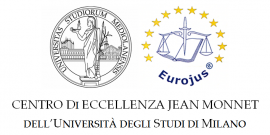Successione di leggi nel tempo e consegna del ricercato: i requisiti per la consegna si valutano secondo la legge applicata ai fatti
L’articolo analizza una recente sentenza, resa dalla Grande Sezione della Corte di giustizia lo scorso 3 marzo (sentenza “X”), riguardante l’interpretazione dell’art. 2, par. 2, decisione-quadro 2002/584/GAI, che ha istituito il mandato d’arresto europeo (MAE). Nello specifico, il Giudice del rinvio (Corte d’appello di Gand) ha chiesto alla Corte di accertare se la soglia dei tre anni imposta dall’art. 2, par. 2, per procedere alla consegna di un soggetto già condannato (in Spagna), si riferisca alla versione della legge applicabile ai fatti che hanno dato origine alla vicenda (e per cui il MAE è stato richiesto) oppure alla legge in vigore al tempo in cui il MAE è stato formulato. Nello specifico, X era stato condannato per un fatto di apologia del terrorismo, reato che il codice penale spagnolo puniva, in origine, con la pena massima di due anni di detenzione, ma, al tempo in cui il MAE è stato emesso, questa soglia risultava differente (tre anni), a causa di una riforma adottata nel frattempo. La sentenza – al pari delle conclusioni dell’avvocato generale Bobek – consente alcune brevi considerazioni, non solo circa il funzionamento del MAE e dei requisiti che devono essere soddisfatti per la consegna del ricercato, ma anche in merito ai principi di legalità e certezza del diritto, in particolare rispetto ai meccanismi di cooperazione giudiziaria in materia penale.
Per leggere l’articolo completo, clicca qui
The article analyses the judgment given by the Grand Chamber of the Court of Justice of the EU (CJEU) on 3rd March (case “X”), which focuses on the interpretation of Article 2(2) of Council Framework Decision 2002/584/JHA on the European arrest warrant (EAW). In particular, the referring judge (Court of Appeal of Ghent, Belgium) asked the Court to ascertain whether the threshold imposed by Article 2(2) – in order to surrender a person already convicted by a Spanish Court – refers to the version of the law applicable to the facts giving rise to the case in which the EAW was issued or to the law in force at the date of issue of the EAW. In the case, X had been convicted for a fact (apology of terrorism) that the Spanish Criminal Code originally punished with a maximum penalty of two years of detention, but, at the time when EAW was issued, this threshold was different (three years), due to an amendment adopted between the date of the acts and the date of issue. The judgment – and the Opinion given by the Advocate general Bobek – allows some considerations, not only about the functioning of EAW and the requisites which must be met in order to survive the convicted person, but also about the principle of legal certainty, especially dealing with mechanisms of judicial cooperation in criminal matters.
To read the full article, click here


